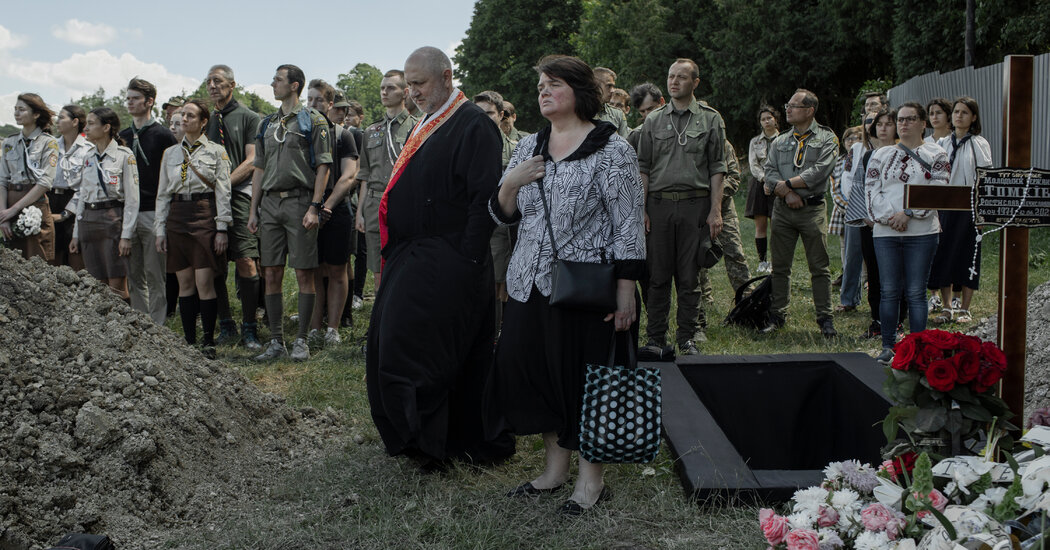
LVIV, Ukraine — Artemiy Dymyd’s closest friends unwrapped his parachute and spread it gently over his grave. The red, silky material swaddled his coffin as it was lowered down.
The men, many soldiers themselves, covered the freshly dug hole with dirt. The first shovelfuls landed with a thud.
The funeral for Mr. Dymyd, a marine killed in action, was the first funeral of the day in Lviv, a western city in Ukraine where residents have seen a relentless stream of their sons killed in the war with Russia. By Tuesday’s end, three other freshly dug graves near Mr. Dymyd’s would also be filled with young soldiers who had died in battle for the country’s east, hundreds of miles away.
The funeral had begun in a Greek Catholic church, an eastern branch of Catholicism that is widespread in Lviv. Mr. Dymyd’s father, a priest, delivered his eulogy. And then his mother, her voice thick with emotion, sang a final lullaby for her son.
The procession then made an all-too-familiar journey from the church to the city’s main market square, where dozens of young people in scouting uniforms formed a honor guard. Mr. Dymyd, 27, had been a part of Ukraine’s scout organization since the age of 7. Young children, teenagers and adults from the group were there to say a final goodbye.
At the bottom of the square, four white placards announced the details of the military funerals to be held in the city on Tuesday, all for men killed in the battle for the country’s east in recent weeks. Three of them never reached their 30th birthday.
One young woman, wearing the distinctive green scarf of the scouts, closed her eyes, drew sharp breaths and clenched her fists to keep her tears at bay as she joined the slow procession for Mr. Dymyd.
Scouting was just one part of his life. Mr. Dymyd also loved traveling and adventure, and extreme sports like parachuting. His nickname was Kurka, which means chicken. Friends said that Metallica music would have been more fitting for his funeral than the military dirges that now play in Lviv’s Lychakiv cemetery daily.
“He is one of the most decent men I’ve ever met,” said Dmytro Paschuk, 26. “He lived many lives in his 27 years. People write books about characters like him, and maybe there will be books soon.”
Mr. Paschuk, who ran a wine bar before the war, served alongside Mr. Dymyd in a special operation unit of the Ukrainian marines. They had become like brothers in the last few months, he said.
On the night of the attack that ended his friend’s life, Mr. Paschuk said, he woke to the sound of an explosion and soon knew that something was wrong. He immediately looked for Mr. Dymyd and saw that another friend was giving him first aid. When he saw Mr. Dymyd’s eyes, he knew it was bad.
“I was scared to be beside him,” he said slowly. “Because when I saw him I felt that he wouldn’t make it.”
Mr. Dymyd died a short time later.
Mr. Paschuk said he had mixed feelings about returning to the front lines in a few days. He described waves of emotions, but he said he was not angry or vengeful.
“I don’t have the feeling I want to kill everyone because this happened,” Mr. Paschuk said. “Thanks to Kurka. He taught me to remain calm.”
Roman Lozynskyi, a fellow marine, had been a friend of Mr. Dymyd for two decades, having met him when they were young scouts. Mr. Lozynskyi, who is a member of Ukraine’s Parliament, volunteered for the military three months ago and served in the same unit as Mr. Dymyd and Mr. Paschuk.
He described his lifelong friend as a “crazy man” with a lust for life who had raced back to Ukraine from a parachuting trip in Brazil to enlist when the war began. Mr. Dymyd wanted to continue parachuting during the war and finally had a chance last month as part of a mission, his friends said.
It was Mr. Dymyd’s brother, Dmytro Dymyd, who thought of placing the parachute in his grave, Mr. Lozynskyi said, in a nod to Mr. Dymyd’s passion for the sport of parachuting. The brother, who is also a soldier, was given permission to attend the funeral but would return to the Donetsk region in a few days.
As the mourners slowly made their way from the cemetery, the grave diggers tamped down the earth on Mr. Dymyd’s grave to a sturdy mound.
There were still three more to go.



